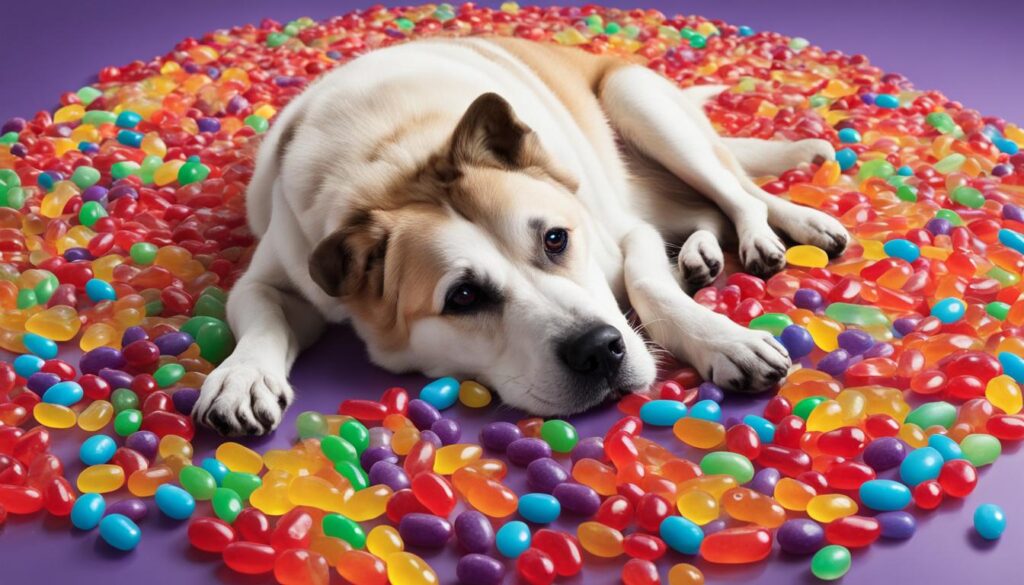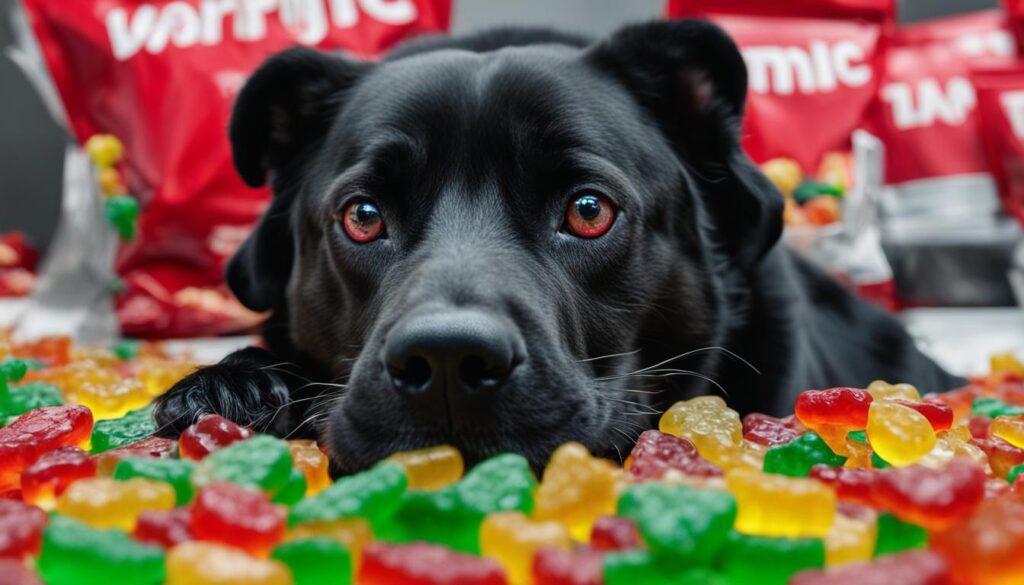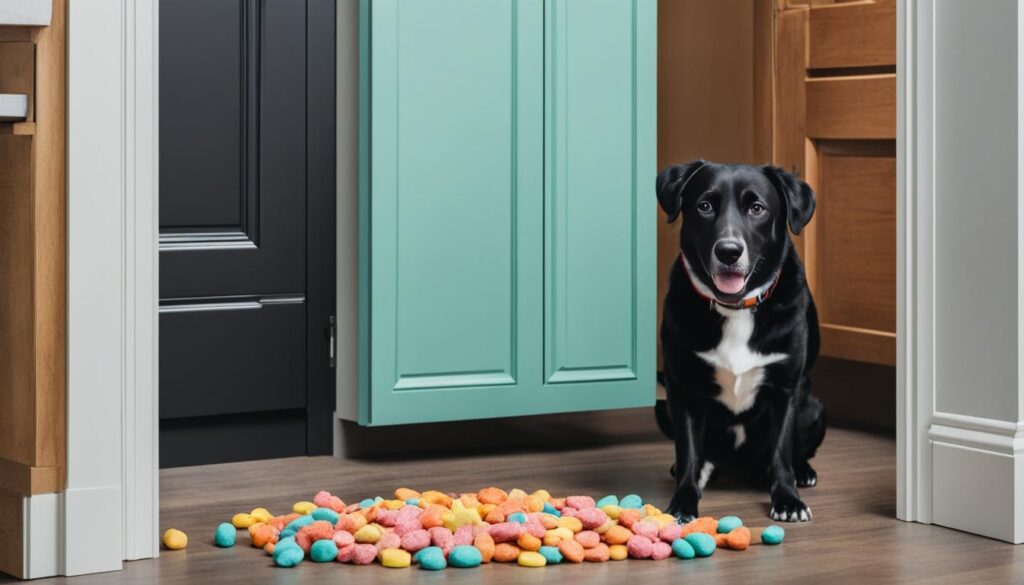Unveiling if Dogs Can Safely Nibble on Jelly Beans
Can dogs eat jelly beans? It’s a common question among dog owners. While jelly beans may be a delicious treat for humans, it’s important to be cautious when it comes to letting your furry friend indulge in these sugary candies.
While some jelly beans may be safe for dogs in moderation, others can pose potential risks to their health. In this article, we will explore the safety of jelly beans for dogs and provide insights into making informed decisions about what treats to offer your canine companion.
Key Takeaways:
- Not all jelly beans are safe for dogs; some may pose health risks.
- It’s important to be cautious when feeding your dog sugary candies.
- Consult with your veterinarian before introducing jelly beans into your dog’s diet.
- Opt for dog-friendly treats that are specifically formulated for their nutritional needs.
- Responsible pet ownership involves being aware of potential risks and making informed choices.
The Risks of Regular Gummy Bears for Dogs
Regular gummy bears, without artificial sweeteners, are generally not toxic to dogs. However, they are high in sugar and can cause an upset tummy if consumed in large quantities. Small dogs and puppies are particularly susceptible to developing gastroenteritis, which can result in vomiting and diarrhea. It’s best to avoid feeding regular gummy bears to your canine companion.

If your furry friend happens to get their paws on some regular gummy bears, you might be wondering what the consequences could be. While these chewy candies won’t have any immediate toxic effects, their high sugar content can lead to an upset tummy for your dog. Large quantities of sugar can disrupt your pup’s digestive system, causing discomfort and possibly triggering gastrointestinal issues like gastroenteritis.
Gastroenteritis is inflammation of the stomach and intestines that can lead to symptoms such as vomiting and diarrhea. Small dogs and puppies are especially vulnerable to developing gastroenteritis due to their delicate digestive systems. Regular gummy bears’ sugary nature can irritate their gastrointestinal tract, leading to an increased risk of these unpleasant symptoms.
It’s important to note that while regular gummy bears may not be toxic, they should still be avoided as a treat for your dog. Instead, opt for dog-approved treats that are specifically formulated to be safe and healthy for our canine friends. There are plenty of delicious options available that won’t wreak havoc on your pup’s digestive system.
Key Takeaways:
- Regular gummy bears are not toxic to dogs but can cause an upset tummy if consumed in large quantities.
- Small dogs and puppies are more susceptible to developing gastroenteritis from consuming regular gummy bears.
- Gastroenteritis can lead to symptoms such as vomiting and diarrhea.
- Choose dog-friendly treats that are formulated to be safe for your furry companion.
The Danger of Xylitol in Sugar-Free Gummy Bears
Sugar-free gummy bears may seem like a harmless alternative to satisfy your sweet tooth, but they can actually be extremely dangerous for dogs. These innocent-looking treats contain a hidden ingredient that poses a significant risk to our canine companions – xylitol.
Xylitol is an artificial sweetener used in many sugar-free products, including gummy bears. While it is safe for humans, xylitol is highly toxic to dogs, even in small amounts. When dogs ingest xylitol, it can lead to a rapid drop in blood sugar, known as hypoglycemia. This can cause symptoms such as weakness, lethargy, disorientation, seizures, and even coma.
The danger doesn’t stop there. Xylitol can also cause severe liver damage in dogs. When consumed, it triggers the release of insulin in their bodies, which can overwhelm the liver and cause liver failure. This can have devastating consequences and can even be fatal for our beloved pets.
That’s why it’s crucial to be vigilant when it comes to choosing treats for your dog. Always check the ingredient list before giving them any sugar-free gummy bears or any other products that could potentially contain xylitol.
The Importance of Reading Labels
When purchasing sugar-free gummy bears or any other sweet treats for your dog, it’s important to read the labels carefully. Look out for ingredients such as xylitol, maltitol, sorbitol, or any other sugar substitutes that can be harmful to dogs. If you’re unsure about any ingredient, consult with your veterinarian to ensure your dog’s safety.
Remember, even a small amount of xylitol can have severe consequences for your furry friend. Prevention is key when it comes to protecting them from xylitol toxicity.
Safe Alternatives for Your Dog
Instead of sugar-free gummy bears, there are plenty of safe and delicious treats available for your dog. Opt for natural dog treats made with wholesome ingredients or choose dog-friendly fruits and vegetables as a healthy snack option. Always prioritize your dog’s well-being and choose treats that are suitable for their dietary needs.
| Treat Options | Description |
|---|---|
| Carrot Sticks | Crunchy and low in calories, carrots are a healthy snack for dogs, packed with vitamins and fiber. |
| Blueberries | These antioxidant-rich berries are a tasty and nutritious treat for dogs. They can be served fresh or frozen. |
| Peanut Butter | Make sure to choose a peanut butter without xylitol or added sugars. Dogs love the creamy texture and taste. |
By choosing dog-friendly treats and being aware of the dangers of xylitol, you can keep your furry friend safe and ensure they enjoy a happy and healthy life.
THC Gummy Bears and the Marijuana Toxicity Risk
With the legalization of marijuana in some states, there has been a growing concern about the accidental pet intoxication from THC gummy bears and other marijuana-infused products. It’s important to understand the potential risks involved and take the necessary precautions to keep your furry friend safe.
THC, which stands for tetrahydrocannabinol, is the psychoactive component of marijuana that produces the “high” sensation in humans. However, when it comes to dogs, THC can be highly toxic and have serious consequences for their health.
Dogs are more sensitive to THC than humans, and even a small amount can pose a risk to their well-being. When dogs consume THC gummy bears or other marijuana products, they can experience a range of symptoms, including sedation, tremors, and seizures.
If you suspect that your dog has been exposed to THC gummy bears or marijuana, it’s crucial to seek immediate veterinary assistance. Timely intervention can make a significant difference in the outcome and help minimize the potential harm caused by marijuana toxicity.
“It’s important to remember that dogs metabolize THC differently than humans, and what may be a small dosage for humans can be toxic for our four-legged companions,” cautions Dr. Emily Thompson, a board-certified veterinarian. “If you have any concerns or suspect exposure, don’t hesitate to reach out to your veterinarian for guidance.”
Remember, responsible pet ownership involves being aware of potential risks and taking proactive steps to ensure your dog’s safety. Keeping THC gummy bears and other marijuana products securely stored and out of your dog’s reach is essential to prevent accidental ingestion.
As a responsible pet owner, it’s always recommended to stick to dog-friendly treats that have been specifically formulated for canine consumption. These treats are designed to meet the nutritional needs of dogs and don’t pose any risks to their health.
By educating yourself about the dangers of THC gummy bears and marijuana toxicity, you can protect your beloved pet from unnecessary harm and ensure their well-being.

What to Do If Your Dog Eats Gummy Bears
If your dog has consumed gummy bears, it’s essential to take prompt action to ensure their well-being. While gummy bears can be a tempting treat, they may pose risks, especially if toxic ingredients are present. Here’s what you need to do if your dog eats gummy bears:
- Assess their condition: Look for signs of distress like vomiting, diarrhea, excessive drooling, or panting.
- Contact your veterinarian: If your dog shows any concerning symptoms or if you suspect they have ingested toxic ingredients such as xylitol or marijuana, reach out to your veterinarian immediately for professional guidance.
- Follow veterinary advice: Your veterinarian will provide instructions on further steps to take and any necessary treatment. It’s crucial to follow their advice to ensure the best possible outcome for your dog.
Remember, the health and well-being of your furry friend is of utmost importance, and seeking veterinary assistance is vital if you have any concerns.
“When it comes to your dog’s health, it’s always better to be safe than sorry. Don’t hesitate to contact your veterinarian if you’re unsure or worried about your dog’s well-being.”
Signs of Distress in Dogs
| Signs of Distress | Description |
|---|---|
| Vomiting | Expelling the contents of the stomach forcefully. |
| Diarrhea | Watery or loose stools. |
| Excessive Drooling | Unusual or uncontrollable salivation. |
| Panting | Rapid or heavy breathing, often with the mouth open. |
Observing and being aware of these signs can help you determine the best course of action when your dog consumes gummy bears or other potentially harmful substances.

Remember, your dog’s health is your responsibility, and taking immediate action and seeking veterinary assistance when necessary can make a significant difference in their well-being.
Conclusion
When it comes to feeding your dog treats, it’s important to prioritize their health and well-being. While regular gummy bears and sugar-free gummy bears containing xylitol should be avoided, there are plenty of other dog-friendly treats that are safe and enjoyable for your furry friend.
Responsible pet ownership means being aware of potential risks and making informed choices about what you feed your dog. Opt for treats specifically made for dogs, as they are formulated to meet their nutritional needs and are free from harmful ingredients. Always consult with your veterinarian if you have any concerns about your dog’s diet or overall health.
Remember, treats should be given in moderation as part of a balanced diet. Look for treats that are not only tasty but also provide health benefits. There are many options available, such as dental chews that promote oral health or treats enriched with vitamins and minerals.
By choosing dog-friendly treats and practicing responsible pet ownership, you can ensure that your beloved canine companion enjoys tasty rewards while staying healthy and happy.
FAQ
Can dogs eat regular gummy bears?
Regular gummy bears are not toxic to dogs, but they are high in sugar and can cause an upset tummy if consumed in large quantities. It’s best to avoid feeding regular gummy bears to your dog.
Are sugar-free gummy bears safe for dogs?
No, sugar-free gummy bears are not safe for dogs. They contain xylitol, an artificial sweetener that is highly toxic to dogs. Even small amounts of xylitol can cause severe hypoglycemia and liver damage, which can be fatal.
Are THC gummy bears or marijuana-infused gummy bears toxic to dogs?
Yes, THC gummy bears and other marijuana-infused products can be toxic to dogs. THC, the psychoactive component of marijuana, can cause symptoms such as sedation, tremors, and seizures in dogs. If you suspect your dog has been exposed to THC gummy bears or marijuana, seek veterinary assistance immediately.
What should I do if my dog ate gummy bears?
If your dog has consumed gummy bears, assess their condition and look for signs of distress. If your dog shows any concerning symptoms or you suspect they have ingested toxic ingredients like xylitol or marijuana, contact your veterinarian right away for guidance and possible treatment.
What are some dog-friendly treats I can give my dog instead of gummy bears?
There are many dog-friendly treats available that are safe and enjoyable for your furry friend. Consult with your veterinarian for recommendations on dog treats that align with your dog’s dietary needs and health.
Please let me know if you need anything else.


